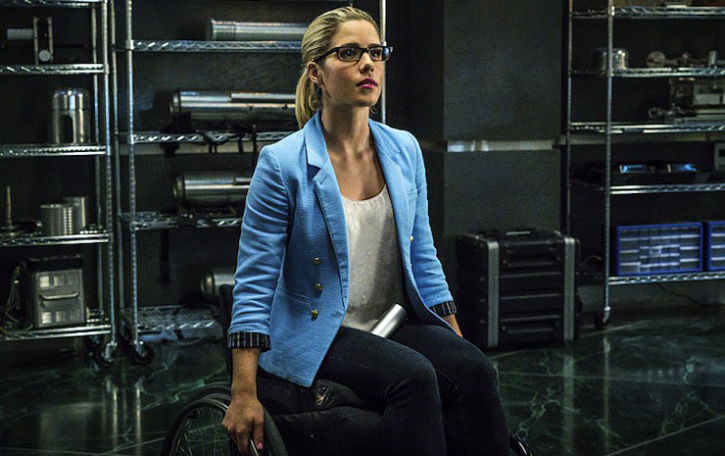The Arrow writer’s room desperately needs a wheelchair user to help them tell accurate stories about using a wheelchair…or I should say, it did need such a person. By now, Felicity has probably already been “cured” and out of her chair, so there’s no need to worry about authenticity when it comes to her wheeling.
The damage has already been done.
When the mid-season finale aired, and it became clear that Felicity was going to end up a wheelchair user, I was already groaning inwardly. Non-disabled screenwriters don’t get disability right. They just don’t. This is largely because for many non-disabled people, their idea of what they think it is like to have a disability is often embedded in harmful stereotyping, which is prevalent in our society.
How we treat disability in society largely dictates how we see disability written for film and television. It is often done without the input of disabled people, so there is no one to point out how harmful disability tropes are, while encouraging the writers not to use them. That being said, I tried to remain hopeful, because I’m a fan of the show. Maybe, by some miracle, they’d get it right… or not.
The first episode with “disabled Felicity” was a bumpy one as the script battled between the same old tired narrative about disability, with Oliver promising to not give up until he found a “cure” for her. However, there were some okay moments, where people reminded her that she was still fully capable of being a part of Team Arrow.
The next few episodes were actually not too bad. The Felicity on Team Arrow narrative was much stronger than the disabled Felicity narrative, and that was good. Like many of us that are disabled, she existed as a human being, and there were a few funny moments, which just reinforced the idea she was the same old Felicity. I would’ve loved to have seen a few intimate moments between her and Oliver, because the idea you can be disabled, feel sexy, and have a relationship (and sex) is something we rarely see in film or on television. It needs to be a part of the disability narrative! The writers had such an amazing opportunity to do this, but it looks like they missed it.
The latest episode, sadly returned back to disappointing territory. Curtis, Felicity’s right hand man, found a way to cure her, and everybody seemed to be grateful. I am secretly hoping that Felicity will realize it’s okay to be disabled, and that her life will be just as fulfilling, even if she uses a wheelchair. However, given how quickly they have found a cure, it doesn’t seem likely this will happen. I can’t believe (and yet, I can – this always happens!) the Arrow writers squandered a great opportunity to show disability in a way it has never been seen before. I can’t say I necessarily agree with making a character disabled, when they are already cast by a non-disabled actor, but since it happened, I just wish they would have done something progressive with the role.
What non-disabled people do not realize is that this is one of only a few narratives we ever see about disability. We are almost always objects of pity. We almost always are “dreaming of a cure”. Our disability is often used as a plot device. When we don’t see much deviation from the same old story, especially something that is inaccurate of most people using wheelchairs, it’s really hard to want to watch these stories.
The truth of it is that I don’t understand why they even bothered to make Felicity disabled in the first place. It was nice to have a brief hiatus for two or three episodes from anyone wanting her to be walking again, but why bother to even make her disabled, if she was going to be “cured” again within a few episodes?! What a disservice to the disabled community, especially to the thousands of disabled actors who can’t get a job because nobody will bother to hire them or even audition them…not even to play themselves!
Maybe, just maybe we will one day see a character on television who is proud to use a wheelchair, and is proud to be disabled. I just don’t think that person is going to be Felicity Smoak.


[…] spoke about the Reeve Foundation following an episode of “Arrow.” The show could have done other things to promote issues facing the SCI community, but it’s a […]